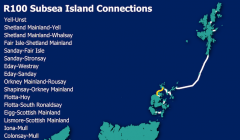Council / SIC considering going it alone to bring superfast broadband to all
Leader Steven Coutts describes government’s ‘failure to deliver’ as ‘unacceptable’
SHETLAND Islands Council (SIC) is exploring the cost of going it alone to provide superfast broadband to every home in the isles amid frustration over the Scottish Government scheme designed to bring connectivity to everyone in the country.
SIC leader Steven Coutts said the council is “losing faith in government programmes to properly and design and deliver for Shetland”.
The councillor added that the “failure to deliver has left a significant digital divide across our community”.
Chief executive Maggie Sandison, meanwhile, said that while it is early days for the project it is receiving priority attention from officers.
She added that the council would be aiming to attract funding.
The Scottish Government’s £600 million Reaching 100% (R100) scheme aims to bring broadband speeds of at least 30Mbps to every home and business in the country.
Last week a group of Liberal Democrat MPs and MSPs in the Highlands and Islands wrote to the Scottish Government expressing their “increasing concern” that R100 programme was two years behind schedule and would not meet the SNP’s election promise of superfast broadband for everyone by 2021.
The majority of properties in central and southern Scotland are only due to be connected by 2023, leading to concerns that the north of Scotland – a historically challenging area for installing broadband infrastructure – could lag even further behind.
The £384 million north contract, which was awarded to BT, is also currently the subject of a legal challenge.
In mitigation the government said people in the north, including in Shetland, would have access to a voucher scheme that would help households and businesses access high speed broadband from other suppliers such as satellite and mobile operators.
Connectivity in Shetland has been a long-standing issue, especially in the outlying areas, but the ongoing Covid-19 pandemic has brought the issue back into sharp focus.
Become a member of Shetland News
Parents in the outer isles have suffered from low speeds while carrying out home learning, while there have also been reports of community councillors – and councillors – suffering connectivity issues in video meetings.
A full meeting of Shetland Islands Council heard last week that there is an opportunity to “build back better” instead of simply going back to normal as the local authority focuses on the recovery from the pandemic.
One strand of this is digital connectivity, and the council has confirmed it is looking into the cost of ditching government schemes and going it alone to provide superfast broadband to all.
It comes as the SIC’s own scheme to install fibre broadband in Unst and Yell for public sector buildings – which could be tapped into by future schemes for homes and businesses – is underway after receiving funding from the UK Government.
“We are currently working on a project to identify what it would take it get superfast connectivity to all homes, what would be required to achieve that and the cost of that,” Sandison said.
“We’d be aiming to try and secure funding for a locally delivered solution as the commitment to ‘outside in’ through R100 and other schemes have failed to deliver for Shetland.
“It is still early days for the project development but we are prioritising resourcing developing the scope so we can understand the scale and cost of the intervention required.”
SIC political leader councillor Steven Coutts, who represents the west side, said R100 has “failed large areas of our community”.
“We have had words and commitments from government but little action,” he continued. “The failure to deliver has left a significant digital divide across our community.
“This was laid bare as we responded to Covid-19 restrictions and the need to work and study and retain social contact through digital means. For many across Shetland, they simply couldn’t do this. That is unacceptable.
“The latest legal challenge to R100 is another delay to the programme. As a council we will now be looking to assess what we can do to scope out what is needed.
“This is very much at early stages but we are losing faith in government programmes to properly design and deliver for Shetland.”
Scottish minister for energy, connectivity and the islands Paul Wheelhouse said in response that the government was “disappointed” by delay caused by the legal challenge to the R100 north contract.
He added that the government would be happy to speak to the SIC on any proposals it might have about investing in connectivity.
“It would be inappropriate to comment on the legal proceedings in respect of the North Lot while those proceedings are ongoing,” he said.
“However, we are as disappointed as local authorities like Shetland Isles council at the delay this is causing to the north lot contract and what that means for residents and businesses on Shetland Isles and elsewhere in the Highlands and Islands.
“We are happy to discuss with Shetland Islands Council any proposals it might have to make funding from its own resources available to invest in digital connectivity in its area.”
The R100 scheme aims to fill in the gaps left by the Digital Scotland Superfast Broadband project, which is led by Highlands and Islands Enterprise and is drawing to a close.
Locally the gaps are mainly focused on the islands, but it also includes a large section of the west mainland and other more remote parts of Shetland.
In 2009 the SIC set up Shetland Telecom to provide a wholesale fibre optic network in the isles.
Latest statistics show that around 75 per cent of Shetland is covered by superfast broadband of more than 30Mbps. Across Scotland the average is nearly 95 per cent.
Eighteen per cent of coverage in Shetland is less than 10Mbps, which is below the UK Government’s new legally-binding Universal Service Obligation.
Data from Think Broadband says that the mean download speed in Shetland at the moment is 18.5Mbps, with an average upload speed of 4.1Mbps.
Become a member of Shetland News
Shetland News is asking its readers to consider paying for membership to get additional perks:
- Removal of third-party ads;
- Bookmark posts to read later;
- Exclusive curated weekly newsletter;
- Hide membership messages;
- Comments open for discussion.
If you appreciate what we do and feel strongly about impartial local journalism, then please become a member of Shetland News by either making a single payment, or setting up a monthly, quarterly or yearly subscription.
















































































